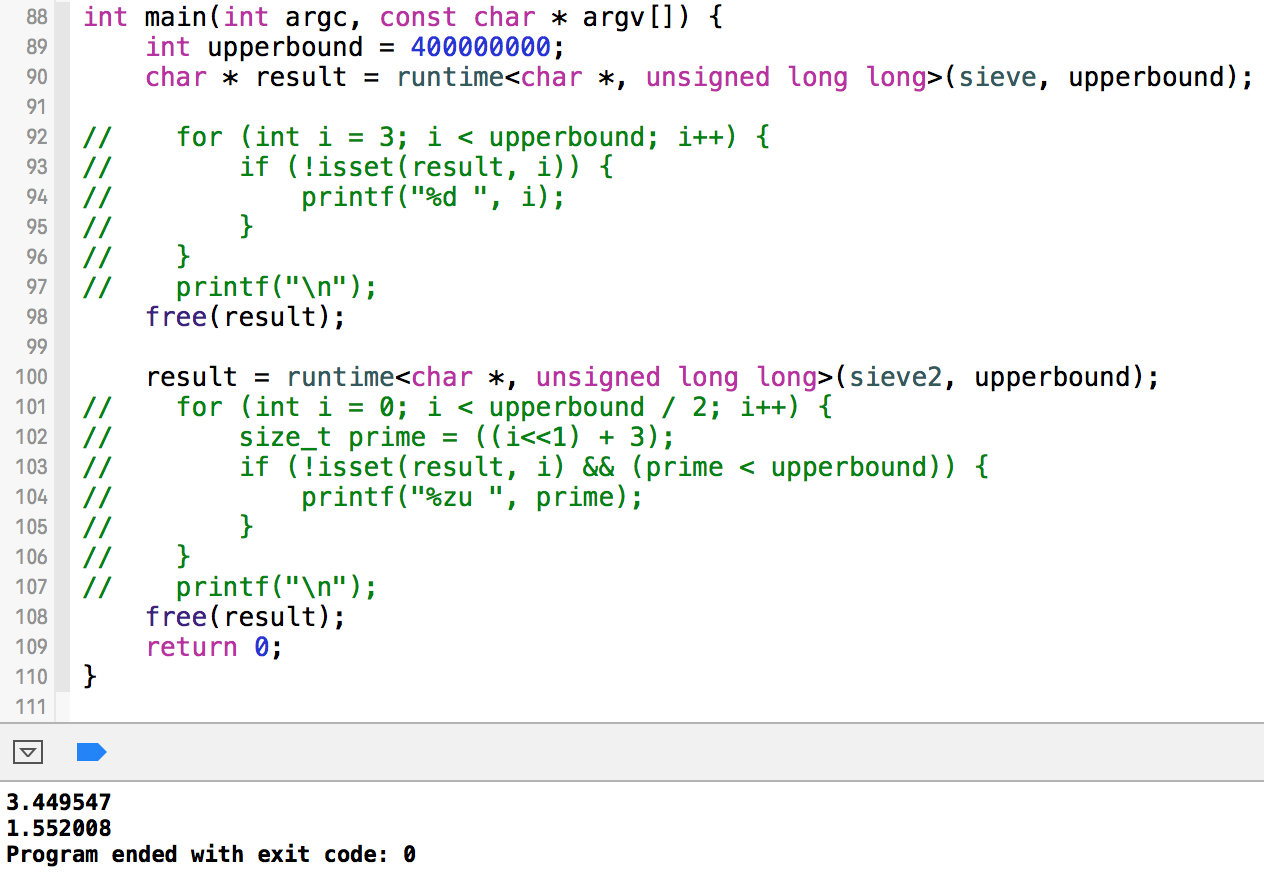之前写了Sieve of Eratosthenes筛法,但总觉得算法还不够好,因为我们为每个数都留了一个bit,而显然的,除了2以外的偶数都不可能是质数,那么如果我们只为奇数申请bit位来标记的话,效率应该有进一步的提升。
在原来的算法中,我们初始化时是这样的
那么,我们真的需要把偶数放进来吗?
Why on earth do we need even numbers while we pick primes
只留下奇数,我们的计算量会少一半
根据Sieve of Eratosthenes筛法,找出100内的质数,只需要循环到sqrt(100)即可。于是我们从3开始循环(为什么不要2呢,因为已经没有其他的偶数了,而且,大家都知道2是唯一一个既是偶数又是质数的数,我们在程序里甚至不必给2保留标志位)
下一个数是11,不必再循环它和比它更大的数了,我们可以验证,此时的确没有还没被标记的11的倍数了
于是,我们就得到了100以内的所有质数(浅绿色标记)
接下来是算法实现。为了方便计算(也是为了和上文一致),我们直接从3开始保存。3的下标是0,5的下标是1,以此类推,我们可以知道数字n与它对应的bit位t的关系是
t = (n - 2) >> 1
然后,我们从i=3开始循环,每次增加2。之后在我们每次从j = i*i开始标记时,因为i一定是奇数, 而j从i*i开始, 那么j也一定是奇数,又因为 奇数+奇数=偶数, 所以我们直接加上2*i来确保得到奇数。
于是修改后的sieve主要部分如下:
// 计算需要多少个字节, (n & 0xF)确保有足够的位 size_t length = n >> CHAR_BIT_LOG; if (n & 0xF) length += 1; // 只保存奇数 length = (size_t)ceil(length / 2.0); result = (char *)malloc(length); memset(result, 0, length); for (int i = 3; i <= (int)floor(sqrt(n)); i+=2) { if (!isset(result, (i - 2) >> 1)) { int j = i*i; while (j <= n) { setbit(result, (j - 2) >> 1); // 因为i一定是奇数, 而j从i*i开始, 那么j也一定是奇数 // 又因为 奇数+奇数=偶数, 所以我们直接加上2*i来确保得到奇数 j += 2*i; } } }
与先前版本的对比,在n=400000000时,优化后的sieve速度翻了一倍以上

以下是源代码,
// // main.cpp // optimum sieve // // Created by Ryza 16/1/28. // Copyright © 2016[data deleted]. All rights reserved. // #include <iostream> #include <functional> #include <chrono> #include <cmath> using namespace std; #define CHAR_BIT_LOG 3 #define MASK (~(~0 << CHAR_BIT_LOG)) #define setbit(a, x) ((a)[(x) >> CHAR_BIT_LOG] |= 1 << ((x) & MASK)) #define isset(a, x) ((a)[(x) >> CHAR_BIT_LOG] & (1 << ((x) & MASK))) char * sieve(unsigned long long n) { char * result = NULL; if (n >= 2) { // 计算需要多少个字节, 检查(n & 0xF)以确保有足够的位 size_t length = n >> CHAR_BIT_LOG; if (n & 0xF) length += 1; result = (char *)malloc(length); memset(result, 0, length); for (int i = 2; i <= (int)floor(sqrt(n)); ++i) { if (!isset(result, i)) { int j = i*i; while (j <= n) { setbit(result, j); j += i; } } } } return result; } char * sieve2(unsigned long long n) { char * result = NULL; if (n >= 2) { // 计算需要多少个字节, 检查(n & 0xF)以确保有足够的位 size_t length = n >> CHAR_BIT_LOG; if (n & 0xF) length += 1; // 只保存奇数 length = (size_t)ceil(length / 2.0); result = (char *)malloc(length); memset(result, 0, length); for (int i = 3; i <= (int)floor(sqrt(n)); i+=2) { if (!isset(result, (i - 2) >> 1)) { int j = i*i; while (j <= n) { setbit(result, (j - 2) >> 1); // 因为i一定是奇数, 而j从i*i开始, 那么j也一定是奇数 // 又因为 奇数+奇数=偶数, 所以我们直接加上2*i来确保得到奇数 j += 2*i; } } } } return result; } template <class Return, class Param> auto runtime(function<Return(Param)> func, Param param) -> Return { Return result; auto start = chrono::high_resolution_clock::now(); result = func(param); auto end = chrono::high_resolution_clock::now(); printf("%lf\n", ((chrono::duration<double>)((end - start))).count()); return result; } int main(int argc, const char * argv[]) { int upperbound = 42; char * result = runtime<char *, unsigned long long>(sieve, upperbound); for (int i = 3; i < upperbound; i++) { if (!isset(result, i)) { printf("%d ", i); } } printf("\n"); free(result); result = runtime<char *, unsigned long long>(sieve2, upperbound); for (int i = 0; i < upperbound / 2; i++) { size_t prime = ((i<<1) + 3); if (!isset(result, i) && (prime < upperbound)) { printf("%zu ", prime); } } printf("\n"); free(result); return 0; }